Critical Analysis: Mental Health Roles and Responsibilities of Nurses
VerifiedAdded on 2023/04/21
|7
|1726
|124
Essay
AI Summary
This essay provides a critical analysis of mental health, particularly focusing on the roles and responsibilities of registered nurses. It defines mental health, discusses depression as a prevalent issue, and emphasizes the importance of nurse-patient relationships in ensuring patient safety and well-being. The essay highlights the legal responsibilities of nurses, including patient monitoring, medication administration, and providing information. It also examines the duties of registered mental health nurses, their adherence to NMBA Registered nurse standards, and the importance of ethical conduct. The analysis underscores the multifaceted roles of nurses in promoting both physical and emotional well-being, and their obligation to act within legal and ethical boundaries, as evidenced by relevant references.
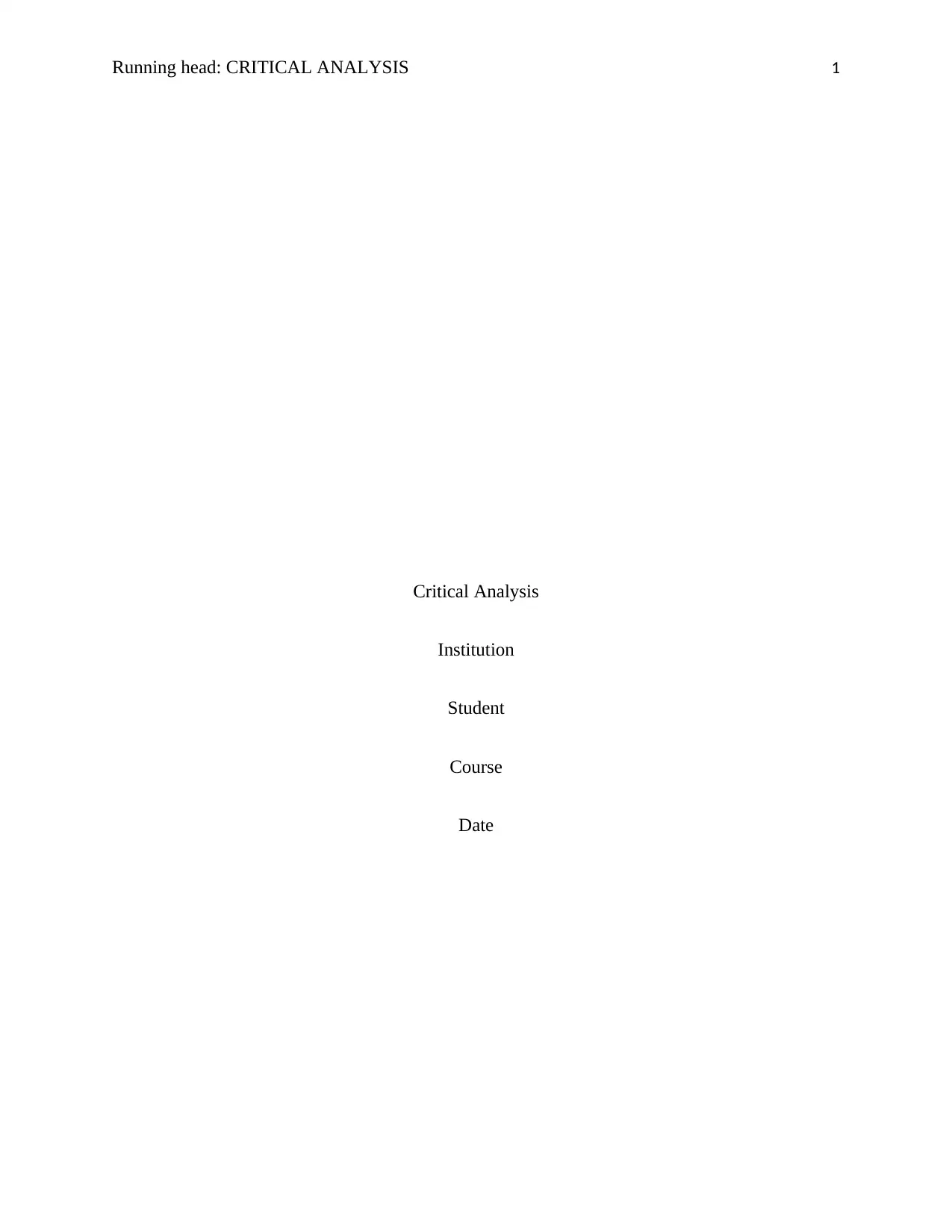
Running head: CRITICAL ANALYSIS 1
Critical Analysis
Institution
Student
Course
Date
Critical Analysis
Institution
Student
Course
Date
Paraphrase This Document
Need a fresh take? Get an instant paraphrase of this document with our AI Paraphraser
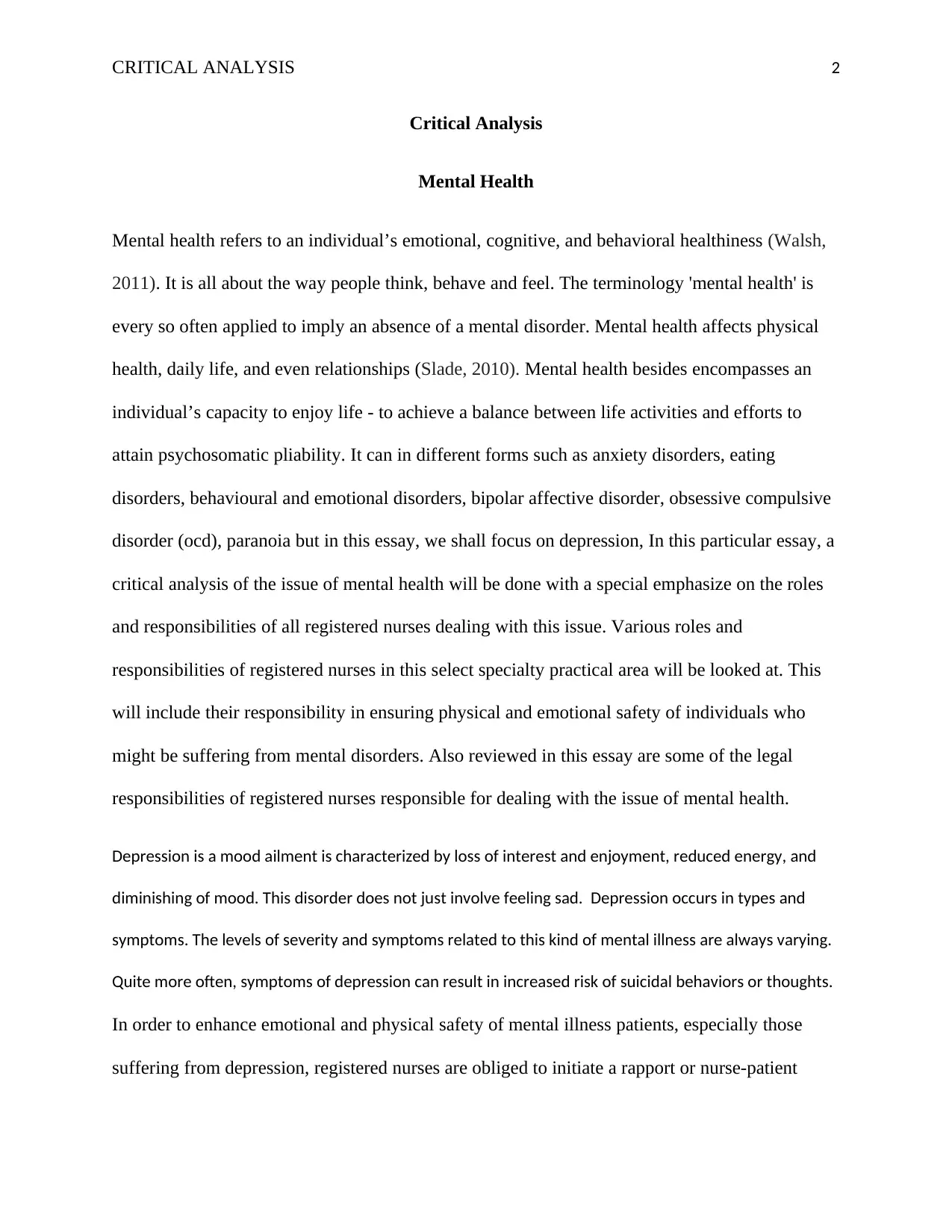
CRITICAL ANALYSIS 2
Critical Analysis
Mental Health
Mental health refers to an individual’s emotional, cognitive, and behavioral healthiness (Walsh,
2011). It is all about the way people think, behave and feel. The terminology 'mental health' is
every so often applied to imply an absence of a mental disorder. Mental health affects physical
health, daily life, and even relationships (Slade, 2010). Mental health besides encompasses an
individual’s capacity to enjoy life - to achieve a balance between life activities and efforts to
attain psychosomatic pliability. It can in different forms such as anxiety disorders, eating
disorders, behavioural and emotional disorders, bipolar affective disorder, obsessive compulsive
disorder (ocd), paranoia but in this essay, we shall focus on depression, In this particular essay, a
critical analysis of the issue of mental health will be done with a special emphasize on the roles
and responsibilities of all registered nurses dealing with this issue. Various roles and
responsibilities of registered nurses in this select specialty practical area will be looked at. This
will include their responsibility in ensuring physical and emotional safety of individuals who
might be suffering from mental disorders. Also reviewed in this essay are some of the legal
responsibilities of registered nurses responsible for dealing with the issue of mental health.
Depression is a mood ailment is characterized by loss of interest and enjoyment, reduced energy, and
diminishing of mood. This disorder does not just involve feeling sad. Depression occurs in types and
symptoms. The levels of severity and symptoms related to this kind of mental illness are always varying.
Quite more often, symptoms of depression can result in increased risk of suicidal behaviors or thoughts.
In order to enhance emotional and physical safety of mental illness patients, especially those
suffering from depression, registered nurses are obliged to initiate a rapport or nurse-patient
Critical Analysis
Mental Health
Mental health refers to an individual’s emotional, cognitive, and behavioral healthiness (Walsh,
2011). It is all about the way people think, behave and feel. The terminology 'mental health' is
every so often applied to imply an absence of a mental disorder. Mental health affects physical
health, daily life, and even relationships (Slade, 2010). Mental health besides encompasses an
individual’s capacity to enjoy life - to achieve a balance between life activities and efforts to
attain psychosomatic pliability. It can in different forms such as anxiety disorders, eating
disorders, behavioural and emotional disorders, bipolar affective disorder, obsessive compulsive
disorder (ocd), paranoia but in this essay, we shall focus on depression, In this particular essay, a
critical analysis of the issue of mental health will be done with a special emphasize on the roles
and responsibilities of all registered nurses dealing with this issue. Various roles and
responsibilities of registered nurses in this select specialty practical area will be looked at. This
will include their responsibility in ensuring physical and emotional safety of individuals who
might be suffering from mental disorders. Also reviewed in this essay are some of the legal
responsibilities of registered nurses responsible for dealing with the issue of mental health.
Depression is a mood ailment is characterized by loss of interest and enjoyment, reduced energy, and
diminishing of mood. This disorder does not just involve feeling sad. Depression occurs in types and
symptoms. The levels of severity and symptoms related to this kind of mental illness are always varying.
Quite more often, symptoms of depression can result in increased risk of suicidal behaviors or thoughts.
In order to enhance emotional and physical safety of mental illness patients, especially those
suffering from depression, registered nurses are obliged to initiate a rapport or nurse-patient
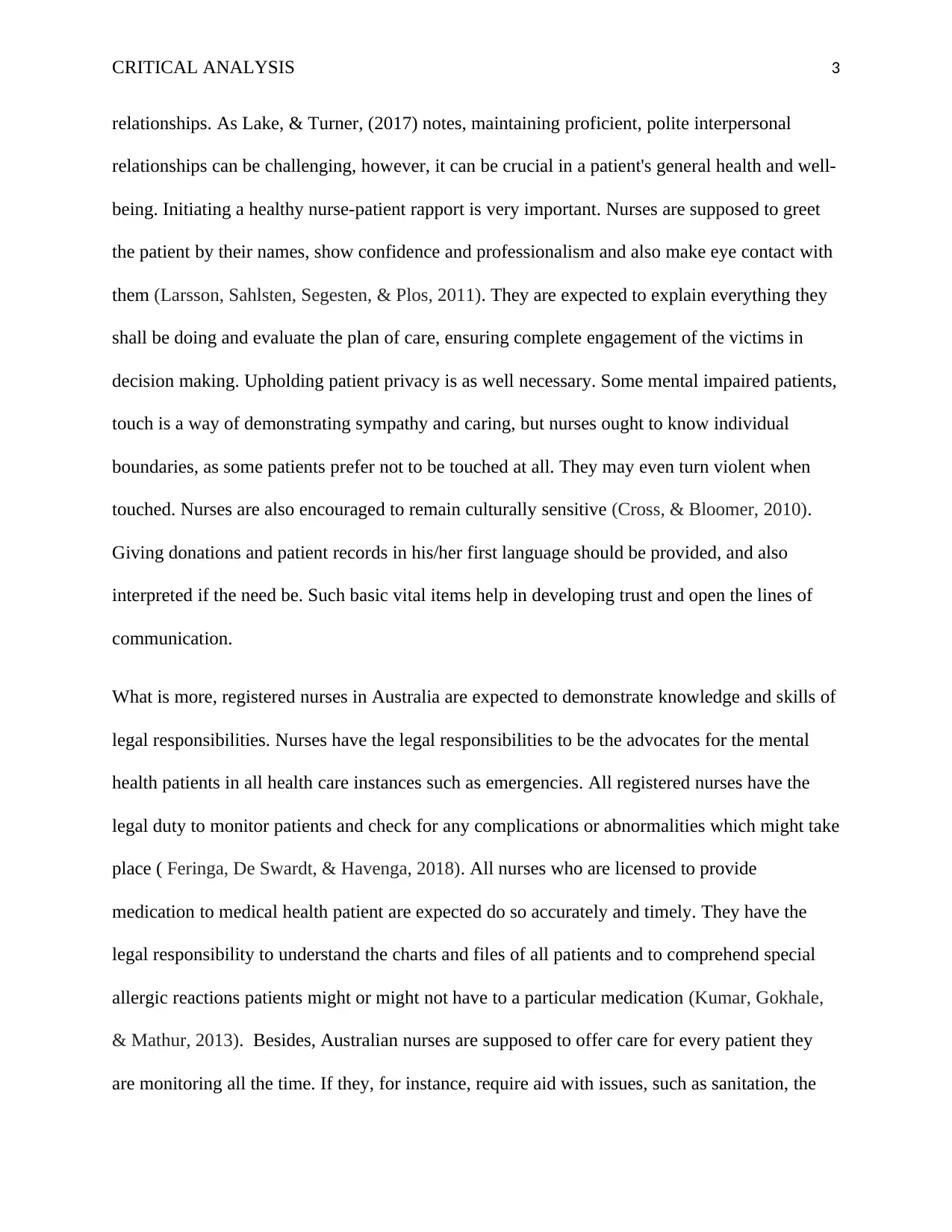
CRITICAL ANALYSIS 3
relationships. As Lake, & Turner, (2017) notes, maintaining proficient, polite interpersonal
relationships can be challenging, however, it can be crucial in a patient's general health and well-
being. Initiating a healthy nurse-patient rapport is very important. Nurses are supposed to greet
the patient by their names, show confidence and professionalism and also make eye contact with
them (Larsson, Sahlsten, Segesten, & Plos, 2011). They are expected to explain everything they
shall be doing and evaluate the plan of care, ensuring complete engagement of the victims in
decision making. Upholding patient privacy is as well necessary. Some mental impaired patients,
touch is a way of demonstrating sympathy and caring, but nurses ought to know individual
boundaries, as some patients prefer not to be touched at all. They may even turn violent when
touched. Nurses are also encouraged to remain culturally sensitive (Cross, & Bloomer, 2010).
Giving donations and patient records in his/her first language should be provided, and also
interpreted if the need be. Such basic vital items help in developing trust and open the lines of
communication.
What is more, registered nurses in Australia are expected to demonstrate knowledge and skills of
legal responsibilities. Nurses have the legal responsibilities to be the advocates for the mental
health patients in all health care instances such as emergencies. All registered nurses have the
legal duty to monitor patients and check for any complications or abnormalities which might take
place ( Feringa, De Swardt, & Havenga, 2018). All nurses who are licensed to provide
medication to medical health patient are expected do so accurately and timely. They have the
legal responsibility to understand the charts and files of all patients and to comprehend special
allergic reactions patients might or might not have to a particular medication (Kumar, Gokhale,
& Mathur, 2013). Besides, Australian nurses are supposed to offer care for every patient they
are monitoring all the time. If they, for instance, require aid with issues, such as sanitation, the
relationships. As Lake, & Turner, (2017) notes, maintaining proficient, polite interpersonal
relationships can be challenging, however, it can be crucial in a patient's general health and well-
being. Initiating a healthy nurse-patient rapport is very important. Nurses are supposed to greet
the patient by their names, show confidence and professionalism and also make eye contact with
them (Larsson, Sahlsten, Segesten, & Plos, 2011). They are expected to explain everything they
shall be doing and evaluate the plan of care, ensuring complete engagement of the victims in
decision making. Upholding patient privacy is as well necessary. Some mental impaired patients,
touch is a way of demonstrating sympathy and caring, but nurses ought to know individual
boundaries, as some patients prefer not to be touched at all. They may even turn violent when
touched. Nurses are also encouraged to remain culturally sensitive (Cross, & Bloomer, 2010).
Giving donations and patient records in his/her first language should be provided, and also
interpreted if the need be. Such basic vital items help in developing trust and open the lines of
communication.
What is more, registered nurses in Australia are expected to demonstrate knowledge and skills of
legal responsibilities. Nurses have the legal responsibilities to be the advocates for the mental
health patients in all health care instances such as emergencies. All registered nurses have the
legal duty to monitor patients and check for any complications or abnormalities which might take
place ( Feringa, De Swardt, & Havenga, 2018). All nurses who are licensed to provide
medication to medical health patient are expected do so accurately and timely. They have the
legal responsibility to understand the charts and files of all patients and to comprehend special
allergic reactions patients might or might not have to a particular medication (Kumar, Gokhale,
& Mathur, 2013). Besides, Australian nurses are supposed to offer care for every patient they
are monitoring all the time. If they, for instance, require aid with issues, such as sanitation, the
⊘ This is a preview!⊘
Do you want full access?
Subscribe today to unlock all pages.

Trusted by 1+ million students worldwide
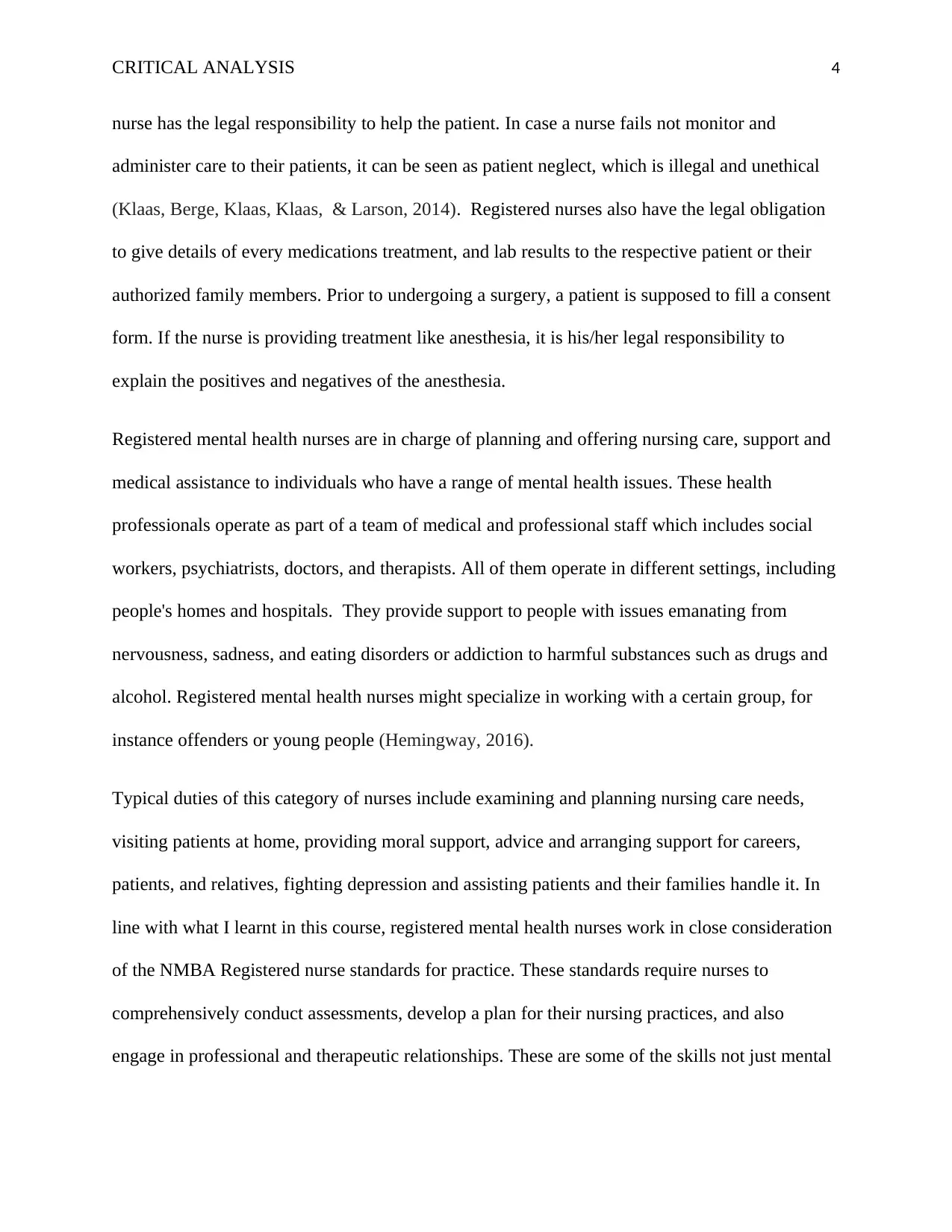
CRITICAL ANALYSIS 4
nurse has the legal responsibility to help the patient. In case a nurse fails not monitor and
administer care to their patients, it can be seen as patient neglect, which is illegal and unethical
(Klaas, Berge, Klaas, Klaas, & Larson, 2014). Registered nurses also have the legal obligation
to give details of every medications treatment, and lab results to the respective patient or their
authorized family members. Prior to undergoing a surgery, a patient is supposed to fill a consent
form. If the nurse is providing treatment like anesthesia, it is his/her legal responsibility to
explain the positives and negatives of the anesthesia.
Registered mental health nurses are in charge of planning and offering nursing care, support and
medical assistance to individuals who have a range of mental health issues. These health
professionals operate as part of a team of medical and professional staff which includes social
workers, psychiatrists, doctors, and therapists. All of them operate in different settings, including
people's homes and hospitals. They provide support to people with issues emanating from
nervousness, sadness, and eating disorders or addiction to harmful substances such as drugs and
alcohol. Registered mental health nurses might specialize in working with a certain group, for
instance offenders or young people (Hemingway, 2016).
Typical duties of this category of nurses include examining and planning nursing care needs,
visiting patients at home, providing moral support, advice and arranging support for careers,
patients, and relatives, fighting depression and assisting patients and their families handle it. In
line with what I learnt in this course, registered mental health nurses work in close consideration
of the NMBA Registered nurse standards for practice. These standards require nurses to
comprehensively conduct assessments, develop a plan for their nursing practices, and also
engage in professional and therapeutic relationships. These are some of the skills not just mental
nurse has the legal responsibility to help the patient. In case a nurse fails not monitor and
administer care to their patients, it can be seen as patient neglect, which is illegal and unethical
(Klaas, Berge, Klaas, Klaas, & Larson, 2014). Registered nurses also have the legal obligation
to give details of every medications treatment, and lab results to the respective patient or their
authorized family members. Prior to undergoing a surgery, a patient is supposed to fill a consent
form. If the nurse is providing treatment like anesthesia, it is his/her legal responsibility to
explain the positives and negatives of the anesthesia.
Registered mental health nurses are in charge of planning and offering nursing care, support and
medical assistance to individuals who have a range of mental health issues. These health
professionals operate as part of a team of medical and professional staff which includes social
workers, psychiatrists, doctors, and therapists. All of them operate in different settings, including
people's homes and hospitals. They provide support to people with issues emanating from
nervousness, sadness, and eating disorders or addiction to harmful substances such as drugs and
alcohol. Registered mental health nurses might specialize in working with a certain group, for
instance offenders or young people (Hemingway, 2016).
Typical duties of this category of nurses include examining and planning nursing care needs,
visiting patients at home, providing moral support, advice and arranging support for careers,
patients, and relatives, fighting depression and assisting patients and their families handle it. In
line with what I learnt in this course, registered mental health nurses work in close consideration
of the NMBA Registered nurse standards for practice. These standards require nurses to
comprehensively conduct assessments, develop a plan for their nursing practices, and also
engage in professional and therapeutic relationships. These are some of the skills not just mental
Paraphrase This Document
Need a fresh take? Get an instant paraphrase of this document with our AI Paraphraser
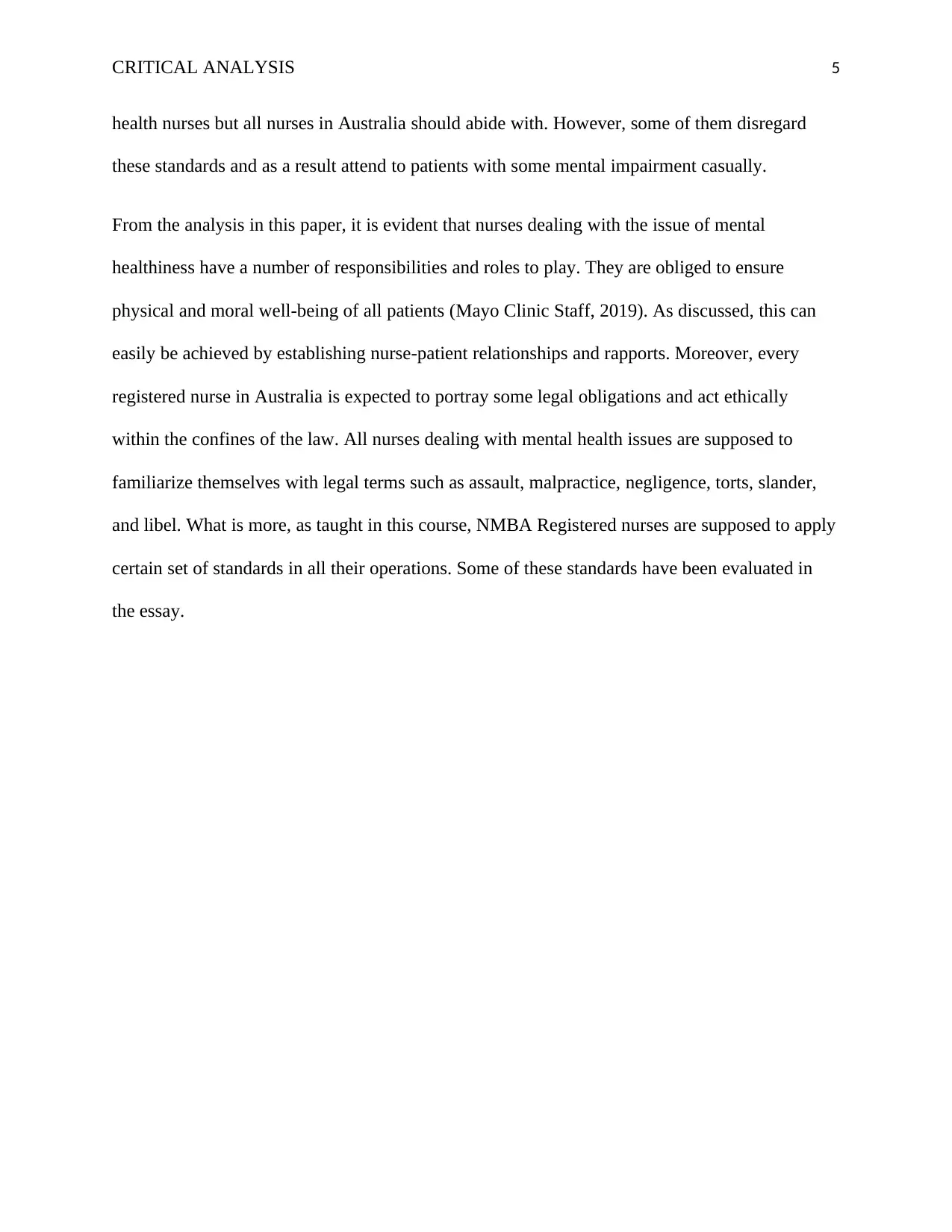
CRITICAL ANALYSIS 5
health nurses but all nurses in Australia should abide with. However, some of them disregard
these standards and as a result attend to patients with some mental impairment casually.
From the analysis in this paper, it is evident that nurses dealing with the issue of mental
healthiness have a number of responsibilities and roles to play. They are obliged to ensure
physical and moral well-being of all patients (Mayo Clinic Staff, 2019). As discussed, this can
easily be achieved by establishing nurse-patient relationships and rapports. Moreover, every
registered nurse in Australia is expected to portray some legal obligations and act ethically
within the confines of the law. All nurses dealing with mental health issues are supposed to
familiarize themselves with legal terms such as assault, malpractice, negligence, torts, slander,
and libel. What is more, as taught in this course, NMBA Registered nurses are supposed to apply
certain set of standards in all their operations. Some of these standards have been evaluated in
the essay.
health nurses but all nurses in Australia should abide with. However, some of them disregard
these standards and as a result attend to patients with some mental impairment casually.
From the analysis in this paper, it is evident that nurses dealing with the issue of mental
healthiness have a number of responsibilities and roles to play. They are obliged to ensure
physical and moral well-being of all patients (Mayo Clinic Staff, 2019). As discussed, this can
easily be achieved by establishing nurse-patient relationships and rapports. Moreover, every
registered nurse in Australia is expected to portray some legal obligations and act ethically
within the confines of the law. All nurses dealing with mental health issues are supposed to
familiarize themselves with legal terms such as assault, malpractice, negligence, torts, slander,
and libel. What is more, as taught in this course, NMBA Registered nurses are supposed to apply
certain set of standards in all their operations. Some of these standards have been evaluated in
the essay.
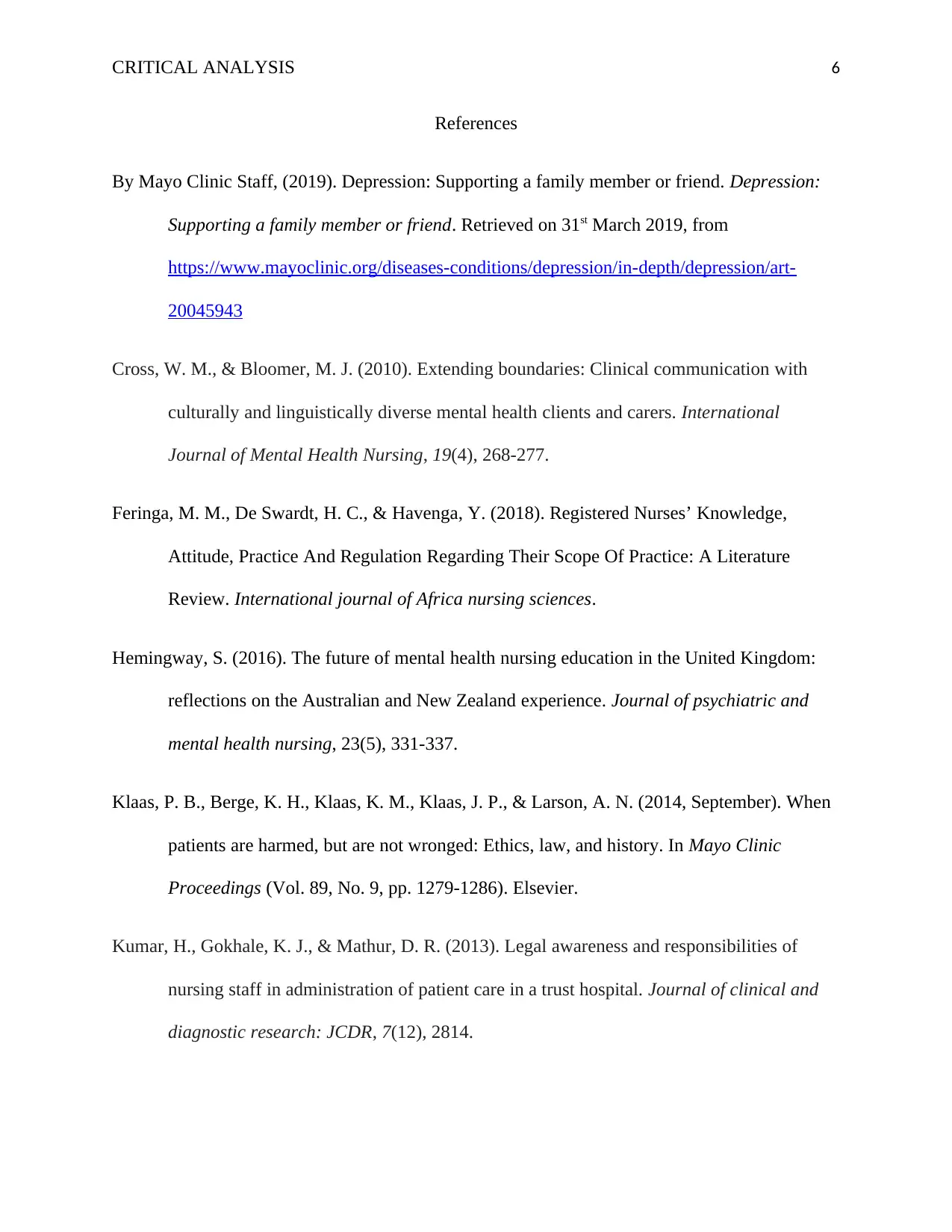
CRITICAL ANALYSIS 6
References
By Mayo Clinic Staff, (2019). Depression: Supporting a family member or friend. Depression:
Supporting a family member or friend. Retrieved on 31st March 2019, from
https://www.mayoclinic.org/diseases-conditions/depression/in-depth/depression/art-
20045943
Cross, W. M., & Bloomer, M. J. (2010). Extending boundaries: Clinical communication with
culturally and linguistically diverse mental health clients and carers. International
Journal of Mental Health Nursing, 19(4), 268-277.
Feringa, M. M., De Swardt, H. C., & Havenga, Y. (2018). Registered Nurses’ Knowledge,
Attitude, Practice And Regulation Regarding Their Scope Of Practice: A Literature
Review. International journal of Africa nursing sciences.
Hemingway, S. (2016). The future of mental health nursing education in the United Kingdom:
reflections on the Australian and New Zealand experience. Journal of psychiatric and
mental health nursing, 23(5), 331-337.
Klaas, P. B., Berge, K. H., Klaas, K. M., Klaas, J. P., & Larson, A. N. (2014, September). When
patients are harmed, but are not wronged: Ethics, law, and history. In Mayo Clinic
Proceedings (Vol. 89, No. 9, pp. 1279-1286). Elsevier.
Kumar, H., Gokhale, K. J., & Mathur, D. R. (2013). Legal awareness and responsibilities of
nursing staff in administration of patient care in a trust hospital. Journal of clinical and
diagnostic research: JCDR, 7(12), 2814.
References
By Mayo Clinic Staff, (2019). Depression: Supporting a family member or friend. Depression:
Supporting a family member or friend. Retrieved on 31st March 2019, from
https://www.mayoclinic.org/diseases-conditions/depression/in-depth/depression/art-
20045943
Cross, W. M., & Bloomer, M. J. (2010). Extending boundaries: Clinical communication with
culturally and linguistically diverse mental health clients and carers. International
Journal of Mental Health Nursing, 19(4), 268-277.
Feringa, M. M., De Swardt, H. C., & Havenga, Y. (2018). Registered Nurses’ Knowledge,
Attitude, Practice And Regulation Regarding Their Scope Of Practice: A Literature
Review. International journal of Africa nursing sciences.
Hemingway, S. (2016). The future of mental health nursing education in the United Kingdom:
reflections on the Australian and New Zealand experience. Journal of psychiatric and
mental health nursing, 23(5), 331-337.
Klaas, P. B., Berge, K. H., Klaas, K. M., Klaas, J. P., & Larson, A. N. (2014, September). When
patients are harmed, but are not wronged: Ethics, law, and history. In Mayo Clinic
Proceedings (Vol. 89, No. 9, pp. 1279-1286). Elsevier.
Kumar, H., Gokhale, K. J., & Mathur, D. R. (2013). Legal awareness and responsibilities of
nursing staff in administration of patient care in a trust hospital. Journal of clinical and
diagnostic research: JCDR, 7(12), 2814.
⊘ This is a preview!⊘
Do you want full access?
Subscribe today to unlock all pages.

Trusted by 1+ million students worldwide
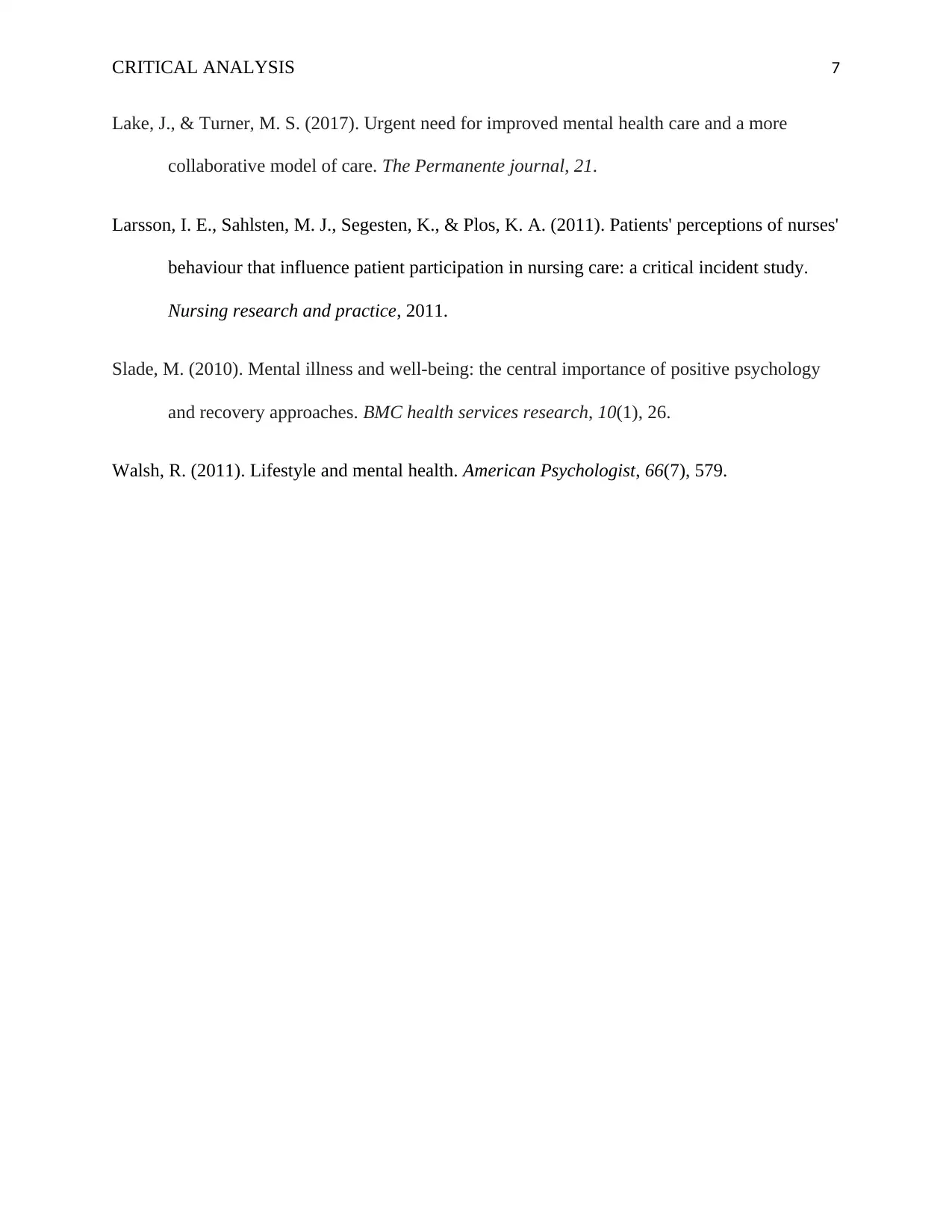
CRITICAL ANALYSIS 7
Lake, J., & Turner, M. S. (2017). Urgent need for improved mental health care and a more
collaborative model of care. The Permanente journal, 21.
Larsson, I. E., Sahlsten, M. J., Segesten, K., & Plos, K. A. (2011). Patients' perceptions of nurses'
behaviour that influence patient participation in nursing care: a critical incident study.
Nursing research and practice, 2011.
Slade, M. (2010). Mental illness and well-being: the central importance of positive psychology
and recovery approaches. BMC health services research, 10(1), 26.
Walsh, R. (2011). Lifestyle and mental health. American Psychologist, 66(7), 579.
Lake, J., & Turner, M. S. (2017). Urgent need for improved mental health care and a more
collaborative model of care. The Permanente journal, 21.
Larsson, I. E., Sahlsten, M. J., Segesten, K., & Plos, K. A. (2011). Patients' perceptions of nurses'
behaviour that influence patient participation in nursing care: a critical incident study.
Nursing research and practice, 2011.
Slade, M. (2010). Mental illness and well-being: the central importance of positive psychology
and recovery approaches. BMC health services research, 10(1), 26.
Walsh, R. (2011). Lifestyle and mental health. American Psychologist, 66(7), 579.
1 out of 7
Related Documents
Your All-in-One AI-Powered Toolkit for Academic Success.
+13062052269
info@desklib.com
Available 24*7 on WhatsApp / Email
![[object Object]](/_next/static/media/star-bottom.7253800d.svg)
Unlock your academic potential
Copyright © 2020–2026 A2Z Services. All Rights Reserved. Developed and managed by ZUCOL.





